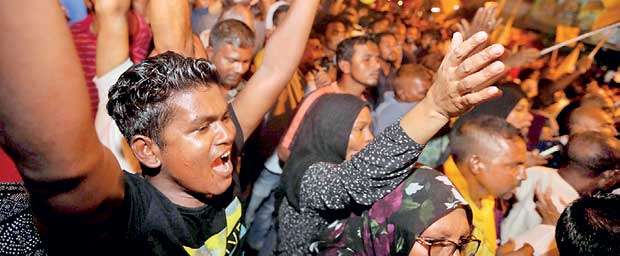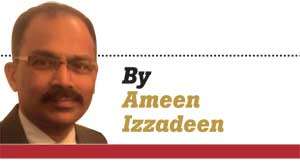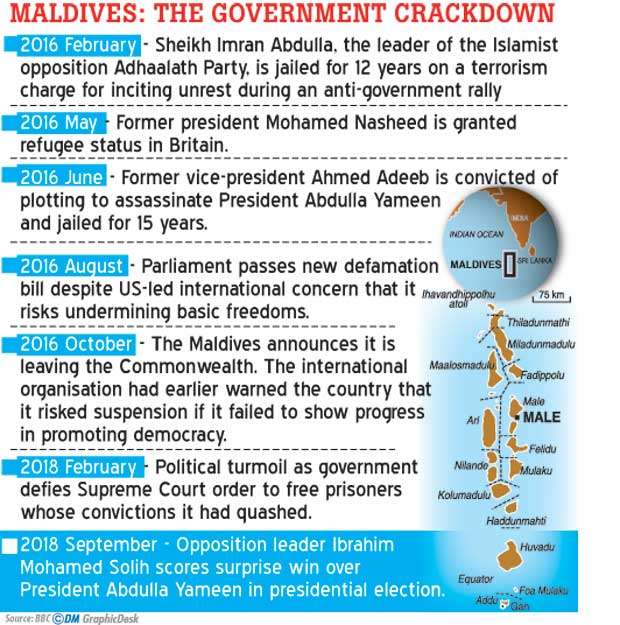Maldives: Democracy restored, but more to be done

Supporters of Maldivian joint-opposition presidential candidate Ibrahim Mohamed Solih celebrate his victory on Monday after the election results were out. Reuters
2018-09-28


 he Maldivian people have spoken loud and clear. There is no place in democracy for an autocrat. The humiliating defeat was overwhelming, for he lost in the first round of the presidential poll. The problem with democracy is that if often produces autocrats and even dictators like Adolf Hitler. It enables eccentrics like Donald Trump and war mongers like George W. Bush to become Presidents of the United States, the world’s most vibrant democracy.
he Maldivian people have spoken loud and clear. There is no place in democracy for an autocrat. The humiliating defeat was overwhelming, for he lost in the first round of the presidential poll. The problem with democracy is that if often produces autocrats and even dictators like Adolf Hitler. It enables eccentrics like Donald Trump and war mongers like George W. Bush to become Presidents of the United States, the world’s most vibrant democracy. But in the United States, the system is provided with checks and balances for politicians to play the power games within the confines of the Constitution and the democratic framework. The Robert Mueller investigations into alleged Russian moves to prop up Trump and Moscow’s alleged links with the Trump team during the 2016 election campaign and the numerous oversight committees in the Congress underline the safeguards embedded to the system. In the US, there is little room for politicians to abuse political power. If they do, the system follows them, exposes them and penalizes them. Strengthening the rule-based political order in the US is a media culture that has produced courageous journalists. Through their investigative journalism, they have brought the downfall of many politicians, including Presidents.

True, only those who live in a fool’s paradise will expect a young democracy such as the Maldives to manifest the features of a powerful democracy like the United States. But one cannot dismiss the Maldivian constitution as inadequate or weak. The 2008 constitution – the country’s sixth -- was adopted after a long process of deliberation and input from constitutional experts, including foreign experts. During the constitution-making process, there were cries and protests from pro-democracy activists and opponents of the then President Maumoon Abdul Gayoom over clauses which they thought could be misused by a Government in power to distort the people’s verdict or to act against the spirit of democracy.
The Maldivian democracy may not be as vibrant as that of the US, but its constitution is as good as that of the US. The problem is not with the constitution but with the guardians of the Constitution. Even a bad constitution can be good, if implemented in the true spirit of democracy. Similarly, a good constitution can turn bad in the hands of power-hungry people. Perhaps it was the weakness of the system – not the constitution – that made an autocrat out of Yameen. If democracy in the Maldives is to be strengthened, institutions such as the judiciary, the public service and the police should be insulated from political interference and their independence should be fiercely protected.
The tiny archipelago of some 350,000 people has seen in its post-independence history many political upheavals. More so, after it became a multi-party democracy in 2008.
In the 2011-12, political crisis, President Mohamed Nasheed, who won the country’s first multi-party elections after the 2008 reforms, was forced to sign his resignation letter at gun point and he had to find refuge in the Indian High Commission. The coup d’état saw Nasheed’s deputy Waheed Hassen taking over as president.
A wild card entry into the Maldivian presidential election race in 2013 after Gayoom’s retirement, Yameen – who is Gayoom’s half-brother -- contested on the Progressive Party of the Maldives ticket but won only 25 percent of the votes, far behind top runner and former President Mohamed Nasheed who won 45 percent of the votes during the first round. However, Yameen narrowly managed to beat Nasheed in the runoff.
During Yameen’s rule, the judiciary had been under constant attack. Even the Chief Justice was arrested after he ordered the government to release political prisoners in a February 2018 ruling and also declared the arrest of former President Mohamed Nasheed unconstitutional. A new chief justice appointed by the president later reversed the order, making the judiciary a mockery under Yameen. Yameen also declared a state of emergency and ordered the armed forces to resist any attempt to impeach or remove him. He even ordered the arrest of former President Gayoom, his political mentor.
Usually, an autocracy is also a kleptocracy. Like Sri Lanka, the Maldives is no exception. In weak democracies such as ours, corruption is deep-seated and the law is applied only selectively. In covering up the theft, the rulers think the people can be mesmerised with showpiece development. In the Maldives’ case, Yameen, with Chinese aid, built the country’s first causeway linking the capital with the airport, new ports and several resorts.
But behind these white elephants was corruption. Al Jazeera, in a series of investigative documentaries, exposed the Maldives’ mega corruption under Yameen’s rule. One documentary exposed how US$ 79 million was siphoned off from the country’s tourism revenue by people connected to the ruling party. It showed secret camera recordings of those involved in the scandal boasting about how they carried bundles of dollars in black bags all the way to the President’s house. Yameen denied the allegations.
Yameen’s autocracy grew under the charade of showpiece development against the backdrop of an emerging cold war in the Indian Ocean region. Nasheed was seen as pro-India. His government let an Indian company manage the Maldives’ main international airport. Yameen was seen to be pro-China and, lately, pro-Saudi, too. Probably because of the China connection, the Yameen regime had the courage to tell India to mind its own business when New Delhi expressed concern over the arrest of Nasheed in 2015, and was not ruffled a bit when the Commonwealth suspended the Maldives’ membership due to the erosion of good governance. In another boorish move, he severed diplomatic ties with Iran in 2016 after Saudi Arabia and its some of its Arab allies did so.
He became arrogant and his hubris was his downfall. He could not coax or cajole the election commission, which stood as the last hope of a democracy-loving people.
In the rise and fall of Yameen, there is a lesson for Sunday’s winner – president-elect Ibrahim Solih -- contesting from Nasheed’s Maldivian Democratic Party. A long time MP, he was seen to be a moderator in the crisis-ridden Maldivian politics and loved for his calm demeanor. The Maldivian people have shown their political maturity by overthrowing an autocrat and placing their faith in democracy. The challenge before the president-elect, fondly called Ibu, is not only to restore democracy and constitutional rule, but also to chart a middle path in the Maldives’ foreign policy to stay clear of the emerging cold war politics in the region.
